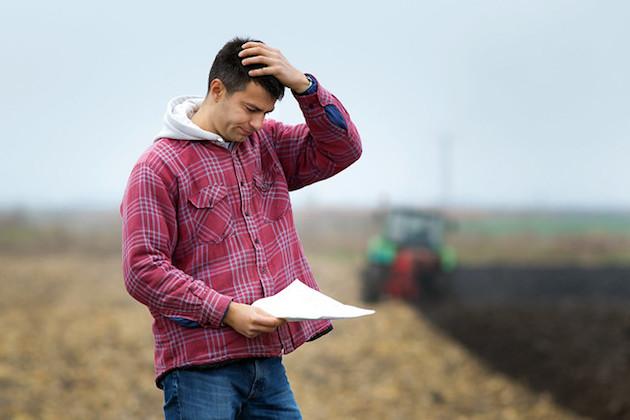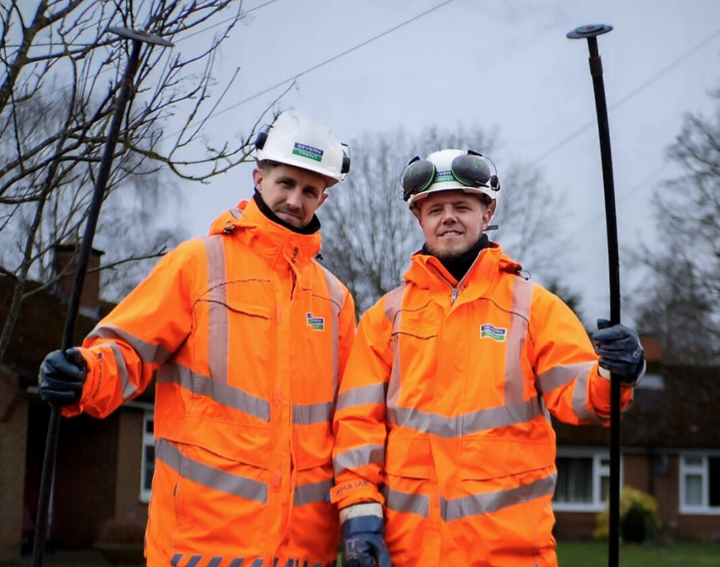Farming in the UK has been hit by an increase in flooding, drought, and heatwaves in recent years.
The effects of the relentless season of storms have had huge consequences for those whose lives and livelihoods depend on the land. Fields flooded, crops destroyed and animals in danger have made recent headlines, but this is only the tip of the iceberg.
The UK’s farming industry has faced many challenges over the past few years, but the emerging mental health challenge may prove the most devastating. A recent study by leading rural charity the Farm Safety Foundation (Yellow Wellies) revealed that poor mental health among farmers and agricultural workers is of growing concern.
In a sample of 450 farmers under the age of 40, respondents almost universally (95%) agreed that poor mental health is the biggest hidden problem facing the industry today. In addition, the research showed a very clear relationship between average working hours and mental health (as measured by WEMWBS).
Those with shorter working hours demonstrated higher levels of mental wellbeing. 61% of farmers surveyed work at least a 10-hour day, 15% working a 14- or 15-hour day with many rarely or never taking a day off. This is something that is giving charities like the Farm Safety Foundation real cause for concern.
In an industry that continues to have the poorest safety record of any occupation in the UK, making sure farmers are prioritising their physical and mental wellbeing has never been more important. 21* farm workers lost their lives in farm accidents in 2022/2023, however, there were 36** suicides registered in England and Wales by those working in the farming and agricultural industry in 2021 according to the Office of National Statistics.
This week, the charity will be focusing on the issue through its seventh annual Mind Your Head campaign. The campaign will continue to raise awareness of the various challenges facing the UK’s farming industry, break down the stigma attached to poor mental health in the farming sector, but recognise that there are steps being taken to address it.
Stephanie Berkeley, Manager of the Farm Safety Foundation said: “Mind Your Head launched in 2018 when concerns about Brexit, policies, administration and legislation were causing increased anxiety in the industry. Fast forward seven years and the campaign has grown and is now recognised by 67% of farmers in the UK.
“Mental health is always a sensitive subject but it’s something that is thankfully growing in importance and profile. The answer to the question “who cares?” is everyone – and everyone should.
“Agriculture is a proud and hardworking industry and vital to the UK economy. Far from being downtrodden, the UK’s farmers are resilient and resourceful and committed to finding ways to tackle any challenge they face.
Over the years we’ve been encouraged by the growing numbers of farm businesses and organisations wanting to learn more about how to help their workers and suppliers as well the incredible individuals taking steps to improve their mental wellbeing and, in this year’s campaign, we will be highlighting them and hopefully inspiring many more to do the same.”
The charity has also been working with Film Director, Rebecca Rose and Swift Rocket Films to premiere an original award-winning independent British short film that explores the aftermath of suicide in a farming family. WAKE is a film about how a family comes to terms with tragic loss and how they cope both psychologically and practically.
Rebecca Rose, the film’s co-writer and director said: “WAKE raises awareness of the under-reported social issue of mental health and suicide in the seemingly idyllic countryside setting and how simple conversations about feelings can start a process to prevent the downward spiral toward the finality of suicide....”
Starring ‘Gavin and Stacey’ actress Alison Steadman OBE, Poldark’s Mark Frost, Emmerdale’s Louisa Clein and rising star Stuart Campbell, the film toured international film festivals in 2022/23 and, the charity launched it through their social media channels yesterday (Monday 12th February) as part of the Mind Your Head campaign.
Actress Alison Steadman said: “I really wanted to be part of this special project as it aimed to explore the mental health challenges that many farmers are facing but aren’t often talked about. It isn’t something that many outside the industry are aware of and many within the industry want to acknowledge.
“I hope this film can encourage more communication within the sector so people don’t have to suffer in silence and can receive support before it’s too late...” Another well-known figure supporting the campaign this year is actor Kelvin Fletcher, who started farming in 2021 after purchasing a 120-acre farm in the Peak District.
As someone who has had first-hand experience of the many challenges facing farmers at present, Kelvin can appreciate the importance of looking after your mental wellbeing at work. BBC Countryfile presenter Adam Henson who last year launched the ‘Keeping on Track’ podcast to raise awareness of mental health difficulties amongst farmers and rural communities joins the team again.
Adam is no stranger to the challenges of rural life however the shock of losing a farming friend to suicide in 2018 inspired him to start campaigning and raising awareness of the mental health issues affecting the industry: ‘I have lived on a farm and been involved in farming all my life,’ he says. “As anyone working in farming knows, every day brings potential joy and disaster – you never quite know what is going to happen and there are many things you can’t control.”
About the Farm Safety Foundation: Rising concern over the continuing high level of fatal and life-changing injury accidents on farms prompted leading rural insurer NFU Mutual to set up a charitable foundation in 2014 to help farmers work safely (Registered Charity No. 1159000).
The Farm Safety Foundation (Yellow Wellies) celebrates its 10th anniversary in 2024. As well as delivering two annual campaigns – Farm Safety Week and Mind Your Head - developing key resources and conducting valuable research, the charity has also delivered training to farm businesses and over 25,000 young farmers at 44 land-based colleges/universities throughout the UK and through the Young Farmers’ Clubs network.
The Foundation works closely with partners in the industry to engage, educate and communicate strong and relatable messages. Over the past decade, the charity has raised awareness of, and continues to drive a real cultural change in attitudes and behaviours to risk-taking and poor mental health in the next generation of farmers through:
- Sector-leading research into attitudes and behaviours to understand the risk factors around farm safety and poor mental health
- Using evidence to influence policy, practice and change
- Running campaigns to raise awareness, reduce stigma and increase help seeking
- Delivering high quality training, learning and skills development
- Working in partnerships with key sector stakeholders, settings and groups to reduce risk taking and poor safety behaviours and provide support.
*21 farm worker deaths in 2022/2023 (HSE Fatal Injuries in Agriculture, Forestry and Fishing in GB report)
**36 suicides registered in England & Wales among the farming and agricultural industry 2021 (Office of National Statistics) This figure is taken from these tables (combining codes 1211, 5111, 5119, 8223, 9111, 9119):
Source:
WEMWBS - The Warwick-Edinburgh Mental Well-being Scale was funded by the Scottish Government National Programme for Improving Mental Health and Well-being, commissioned by NHS Health Scotland, developed by the University of Warwick and the University of Edinburgh, and is jointly owned by NHS Health Scotland, the University of Warwick and the University of Edinburgh. The Warwick-Edinburgh Mental Well-being Scale is a respected scale of mental well-being at a given time. Participants are given 14 statements, worded positively, addressing aspects of positive mental health. Respondents have to take each statement and allocate a number on how they have felt about that over the past two weeks on a scale from 1 to 5… The answers are then totalled and a number allocated ranging from 7 (meaning none of the time) to 70 (meaning all of the time).
A higher mean score indicates greater positive mental wellbeing and a lower number means that the respondent has mental wellbeing scores that are sufficiently low to cause concern. As a guide, mean scores for the general population are reported in population surveys and they are generally around 51 in the UK. (Collect, score, analyse and interpret WEMWBS (warwick.ac.uk)).
WEMWBS has been compared with a measure of depression, the Centre for Epidemiological Studies Depression Scale (CES-D). It suggest that a WEMWBS score of ≤40 could indicate ‘high risk of depression’ as defined by the CES-D.
Rising concern over the continuing high level of fatal and life-changing injury accidents on farms prompted leading rural insurer NFU Mutual to set up a charitable foundation in 2014 to help farmers work safely (Registered Charity No. 1159000).
The Farm Safety Foundation (Yellow Wellies) celebrates its 10th anniversary in 2024. As well as delivering two annual campaigns – Farm Safety Week and Mind Your Head - developing key resources and conducting valuable research, the charity has also delivered training to farm businesses and over 25,000 young farmers at 44 land-based colleges/universities throughout the UK and through the Young Farmers’ Clubs network.
The Foundation works closely with partners in the industry to engage, educate and communicate strong and relatable messages. Over the past decade, the charity has raised awareness of, and continues to drive a real cultural change in attitudes and behaviours to risk-taking and poor mental health in the next generation of farmers through:
- Sector-leading research into attitudes and behaviours to understand the risk factors around farm safety and poor mental health
- Using evidence to influence policy, practice and change
- Running campaigns to raise awareness, reduce stigma and increase help seeking
- Delivering high quality training, learning and skills development
- Working in partnerships with key sector stakeholders, settings and groups to reduce risk taking and poor safety behaviours and provide support.
*21 farm worker deaths in 2022/2023 (HSE Fatal Injuries in Agriculture, Forestry and Fishing in GB report)
**36 suicides registered in England & Wales among the farming and agricultural industry 2021 (Office of National Statistics) This figure is taken from these tables (combining codes 1211, 5111, 5119, 8223, 9111, 9119):
Source:
WEMWBS - The Warwick-Edinburgh Mental Well-being Scale was funded by the Scottish Government National Programme for Improving Mental Health and Well-being, commissioned by NHS Health Scotland, developed by the University of Warwick and the University of Edinburgh, and is jointly owned by NHS Health Scotland, the University of Warwick and the University of Edinburgh.
The Warwick-Edinburgh Mental Well-being Scale is a respected scale of mental well-being at a given time. Participants are given 14 statements, worded positively, addressing aspects of positive mental health. Respondents have to take each statement and allocate a number on how they have felt about that over the past two weeks on a scale from 1 to 5… The answers are then totalled and a number allocated ranging from 7 (meaning none of the time) to 70 (meaning all of the time).
A higher mean score indicates greater positive mental wellbeing and a lower number means that the respondent has mental wellbeing scores that are sufficiently low to cause concern. As a guide, mean scores for the general population are reported in population surveys and they are generally around 51 in the UK. (Collect, score, analyse and interpret WEMWBS (warwick.ac.uk)).
WEMWBS has been compared with a measure of depression, the Centre for Epidemiological Studies Depression Scale (CES-D). It suggest that a WEMWBS score of ≤40 could indicate ‘high risk of depression’ as defined by the CES-D.












